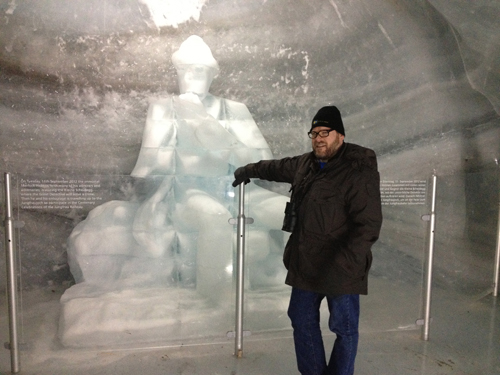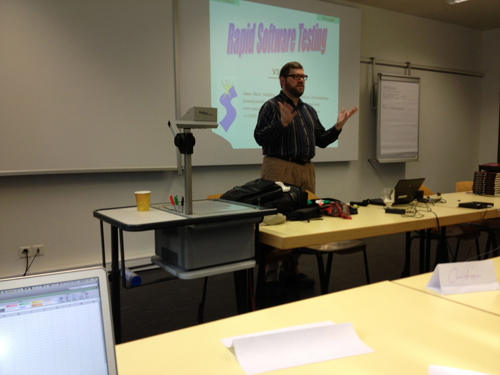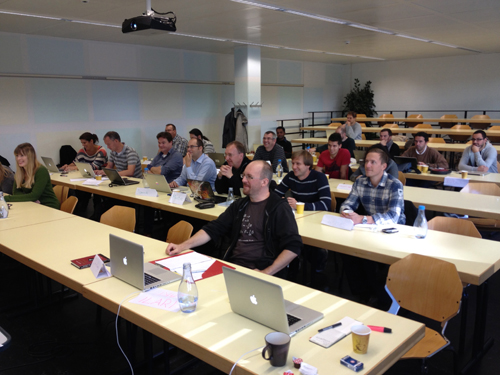Oct 2012
Geen Fietsen Plaatsen - Excursion to #DEWT2
17.10.2012 - 13:58 - Filed in: Software Testing

I have always enjoyed the sound of the Dutch language; for one, because there is a proximity to Swiss German and also because it sounds friendly: ‘GEEN FIETSEN PLAATSEN’ - not here, put your bike elsewhere.
Schipool welcomed me with enthusiastic rainfall and energetic wind blows. It was Friday, 5 October 2012. I decided to have a walk in Amsterdam. Jordaan is a good place to drink coffee and contemplate. Later the day I met Joep Schuurkes and together we drove to Driebergen, which is about a 50min drive south-east of Amsterdam.
The DEWT guys had found a great place for a peer conference. Hotel Bergse Bossen is located in the middle of a forest and there is a lot of space to sit together and confer. And what would be a better start of a conference than have some beers together.

We had a relaxed evening, and Jean-Paul Varwijk gave a short lightning talk which resulted in a discussion whether the club of testers, who subscribes itself to the context-driven school, was too elitist. I believe this is a question that needs some more thinking.
The testers I know from the context-driven school all have at least two character traits. They all are very eager to learn as much as possible, and - and this is important - they also want to share it with anybody who asks. Yes, there is a relentless urge to become better, and that might put off some people. Should we care? Yes, of course we should. But under no circumstances would it be justified to move in the direction of mediocricy. And what we shouldn’t do neither, is become a club of arrogant pricks, frowning at everybody else.

The second day was filled with talks I won’t go into in detail because they have already been elaborated on here. Instead, I want to mention our walk in the woods, honoring the peripatetic school. I had an engaging talk with Jean-Paul Varwijk about dysfunctional management systems. Why not establish regular walks at conferences? I have always enjoyed concurrent thinking, talking and walking.
To finish up here, I think Simon Peter Schrijver deserves a special mention, as he found a healthy middle ground between assertiveness and humorous coolness as a facilitator of DEWT2. Well done, man!

I enjoyed coming to Driebergen, and I hope to come back soon. DEWT3 will take place on the weekend of 20/21 April 2013. Would be happy to join the Dutch crowd again.
Comments
We Attended Rapid Software Testing because we Want to Grow our Testing Skills at eBay
07.10.2012 - 18:37 - Filed in: Software Testing

For the second time this year, James Bach came to Switzerland. After having had one of the Keynotes at Swiss Testing Day in March (see the recording here) and spending time with me on solving puzzles, intensive discussions on testing and reviewing Skype coaching transcripts (see my previous post here), it was time for Rapid Software Testing at eBay.
As usual, James arrived in Switzerland a few days earlier in order to re-balance his jet lag. Knowing that James loves the mountains, I just had to show him Jungfraujoch, which is a spectacular ride on the train and also the highest train station in Europe. We walked on ice and worked out a graphical proof of the addition of ascending odd numbers starting with 1 being n^2 for n being the number of odd numbers added. (Send me your solution, if you feel inclined to solve it graphically)

We at eBay International are a team of 13 testers. As we also wanted to connect with other testers, I extended my invitation to RST to other testers within the eBay family. The enthusiasm level was high and we ended up being 24 people from eBay, marktplaats.nl, mobile.de, brands4friends.de, tradera.se, dba.dk and two developers from eBay, who all found it important enough to spend 3 full days on software testing education.
James jumped right into getting our brains to work with an assignment on how to test font sizes in Wordpad. Appears to be a straightforward task until you spend some time thinking about it. What exactly are sizes of fonts? How do you measure them? On paper? On the screen? What screen? Is it even relevant for Wordpad? How relevant? Good testers immediately start with asking questions.
“If you talk about the number of tests without specifying their content, the discussion becomes meaningless” -- James Bach
Many of the exercises and ‘hot seat’ situations exemplified, that software testing is a demanding and intellectually challenging activity. The hot seat situations consisted of one participant being engaged by James into solving a task. This was tough, since James is very skilled at spotting inaccurate thinking. And once he has done so, he is in your face and all over you. One needs to have nerves of steel in order to successfully navigate through the traps set by James; and the eBay testers mostly proved worthy.
As much as one needs good technical understanding in software testing, there are other qualities equally important. An exercise on ‘shallow agreement’ - a state where you believe that you are talking about the same thing - demonstrated, how important the clarification of assumptions is in software testing.

And why can’t you just automate everything? Simple reason: you can only automate what you know (and even in that category, most would be impractical since of the costs involved to automate it would be too high).
In non-human systems there is a fundamental absence of peripheral wisdom, which is what allows collateral observation. Humans are very good at detecting violations of expectations they did not even know they had. Does that sound obscure? Talk to me on Skype (ID: ilarihenrik) and I can show you with an exercise.
I am very happy that we had the opportunity to spend 3 full days on deep and active reflection on software testing. It is important to acknowledge, that software testing consists of more than just writing scripts and fiddling on automation frameworks. A skillful tester chooses his/her tools according to the needs presented by the testing challenge, and not blindly by following some imaginary ‘best practices’.
Two areas I will focus on with my team in the near future: modelling and reporting. Modelling for its necessity to grasp the complexity of a big system like eBay, reporting out of the need to be able to explain what we do. You not only need to be good at testing but also at explaining what you do. A good report should give an accurate impression on what I as a tester did during the period I tested.
I believe it would be a good idea if more executives in large companies attended Rapid Software Testing. It might clarify some of the misguided assumptions on what software testing is all about.